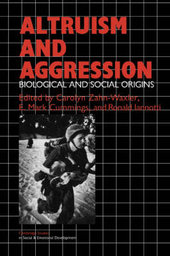
|
Altruism and Aggression: Social and Biological Origins
Paperback / softback
Main Details
| Title |
Altruism and Aggression: Social and Biological Origins
|
| Authors and Contributors |
Edited by Carolyn Zahn-Waxler
|
|
Edited by E. Mark Cummings
|
|
Edited by Ronald J. Iannotti
|
| Series | Cambridge Studies in Social and Emotional Development |
|---|
| Physical Properties |
| Format:Paperback / softback | | Pages:352 | | Dimensions(mm): Height 228,Width 151 |
|
| ISBN/Barcode |
9780521423670
|
| Classifications | Dewey:152.4 |
|---|
| Audience | | Tertiary Education (US: College) | | Professional & Vocational | |
|---|
| Illustrations |
Worked examples or Exercises
|
|
Publishing Details |
| Publisher |
Cambridge University Press
|
| Imprint |
Cambridge University Press
|
| Publication Date |
26 July 1991 |
| Publication Country |
United Kingdom
|
Description
In this timely collection, biological and behavioral scientists address questions emerging from new research about the origins and interconnections of altruism and aggression within and across species. They explore the genetic underpinnings of affiliative and aggressive orientations as well as the biological correlates of these behaviors. They consider environmental variables--family patterns, childrearing practices--that influence prosocial and antisocial behaviors. And they examine internal processes such as empathy, socio-inferential abilities, and cognitive attributions, that regulate "kindness" and "selfishness." The first section focuses on biological, sociobiological, and ethological approaches. It explores the utility of animal models for understanding both human and infrahuman social behavior. The second section focuses on the development, socialization, and mediation of altruism and aggression in children. Several concerns underly both sections. These include the role of attachment processes, separation distress, reciprocal interchanges, and social play in determining the quantity and quality of aggressive and affiliative interactions; the function of emotions (e.g. empathy, guilt, and anger) as instigators of altruism and aggression; and the nature of sex differences. Several chapters present data on emotions that mediate altruism and aggression and also on patterns of association between prosocial and antisocial behaviors. The authors take an ethological perspective, placing special importance on the need to explore altruism and aggression in the real lives and natural habitats of humans and other animals.
Reviews"...likely to be of considerable interest both to researchers working in relevant areas and to scientists and students from other disciplines..." Science "Among the many merits in this book is the diversity of the psychological approaches represented, and these are admirably brought together..." Contemporary Psychology "...the approaches and research strategies described in this book are the waves of the future..." New England Journal of Medicine
|